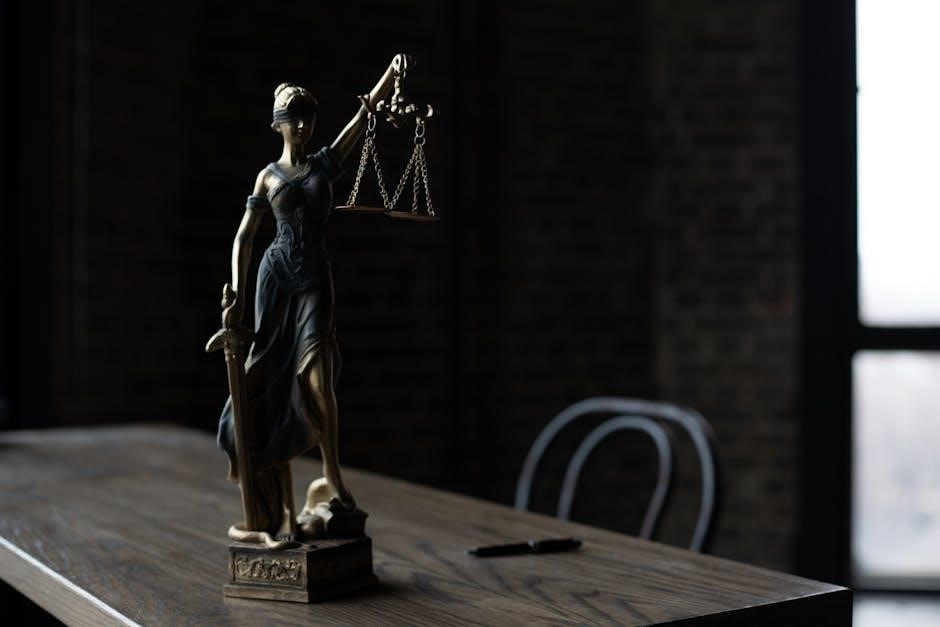The trial and death of Socrates‚ as recorded in Plato’s dialogues‚ remain a pivotal moment in philosophy‚ exploring justice‚ truth‚ and the clash of ideals in ancient Athens․

1․1 Historical Context of Socrates’ Trial
The trial of Socrates occurred in Athens around 399 BCE‚ a period of political instability following the Peloponnesian War․ Athens‚ a democratic city-state‚ was recovering from defeat and social unrest․ Socrates‚ a prominent philosopher‚ faced charges of impiety and corrupting youth‚ partly due to his questioning of authority and traditional beliefs․ His methods and ideas were seen as subversive by the Athenian elite․ The trial reflected broader tensions between philosophical inquiry and societal norms․ Plato’s dialogues‚ including the Euthyphro‚ Apology‚ Crito‚ and Phaedo‚ provide key insights into these events‚ shaping the historical record of Socrates’ trial and its significance․

1․2 Significance of the Trial in Western Philosophy
The trial and death of Socrates marked a cornerstone in Western philosophy‚ symbolizing the clash between individual conscience and state authority․ Socrates’ unwavering commitment to truth and his refusal to compromise his principles‚ even in the face of death‚ established him as a martyr for free inquiry․ His methods of questioning‚ as recorded by Plato‚ laid the foundation for critical thinking and dialectical reasoning․ The trial’s legacy endures as a powerful symbol of intellectual freedom and the pursuit of wisdom‚ influencing countless philosophers and shaping the development of Western thought․ It remains a testament to the enduring tension between authority and dissent․

The Trial of Socrates
Socrates was tried in ancient Athens on charges of impiety and corrupting the youth․ The trial‚ documented by Plato‚ highlighted tensions between Socrates’ teachings and societal norms‚ leading to his conviction and execution․
2․1 The Charges Against Socrates
The charges against Socrates were rooted in his philosophical methods and perceived threat to Athenian society․ He was accused of impiety‚ not recognizing the gods of the state‚ and corrupting the youth by encouraging critical thinking and questioning authority․ These charges were brought by three citizens: Meletus‚ Anytus‚ and Lycon․ Meletus‚ a young poet‚ formally indicted Socrates‚ alleging that he introduced new deities and undermined traditional beliefs․ Socrates’ defense‚ as recorded in Plato’s Apology‚ emphasized his divine mission to seek wisdom and his commitment to ethical living․ The trial highlighted the tension between individual conscience and societal expectations․
2․2 The Trial Process in Ancient Athens

The trial of Socrates followed the legal procedures of ancient Athens‚ which were designed to ensure public accountability․ The process began with a preliminary hearing before the Boule‚ a council of citizens‚ to determine whether the case warranted a full trial․ Once formal charges were brought‚ the case was presented to a jury of 501 male citizens‚ selected by lot to ensure representation․ The prosecution and defense each delivered speeches‚ with no formal legal representation․ The jury voted on guilt or innocence‚ and if guilty‚ proposed penalties․ In Socrates’ case‚ the majority voted for the death penalty‚ reflecting the democratic ideals and legal practices of the time․
2․3 Socrates’ Defense: The Apology
In his defense‚ Socrates delivered a speech known as The Apology‚ where he argued that his actions were divinely inspired and that he was innocent of the charges․ He claimed his wisdom lay in recognizing his own ignorance and encouraged others to seek self-knowledge․ Socrates maintained that he acted out of love for Athens and its citizens‚ striving to awaken them to moral and intellectual awakening․ He refused to renounce his philosophical mission‚ even when faced with death‚ emphasizing that abandoning his principles would be a greater injustice than execution․ His defense‚ recorded by Plato‚ remains a cornerstone of philosophical thought‚ showcasing his commitment to truth and integrity․ His words continue to inspire reflections on morality‚ justice‚ and the role of the individual in society․ His unwavering stance demonstrated his belief in the higher purpose of his life’s work‚ leaving a lasting legacy in Western philosophy․

The Death Sentence and Its Aftermath
The death sentence of Socrates was delayed due to the sacred ship to Delos․ His final days in prison were marked by profound discussions in the Phaedo‚ where he contemplated death and the soul․ The execution‚ despite the delay‚ deeply impacted his followers‚ particularly Plato‚ who was inspired to establish the Academy․ This event became a cornerstone of Western philosophy‚ symbolizing the tension between individual conscience and state authority․
3․1 The Delay in Execution: The Sacred Ship to Delos
The execution of Socrates was postponed due to an Athenian religious custom․ Each year‚ a sacred ship sailed to the island of Delos to honor the god Apollo․ According to tradition‚ no executions could occur in Athens until the ship returned․ At the time of Socrates’ trial‚ unfavorable winds had delayed its voyage‚ creating a waiting period․ This delay allowed Socrates to engage in profound philosophical discussions with his followers‚ as recorded in Plato’s Phaedo․ The sacred ship’s journey symbolized a divine interlude‚ giving Socrates a final opportunity to reflect on the nature of death and the soul‚ leaving a lasting legacy in Western philosophy․

3․2 Socrates’ Final Days in Prison
During his final days in prison‚ Socrates displayed remarkable calm and composure․ Despite his impending execution‚ he engaged in deep philosophical discussions with his followers‚ as documented in Plato’s dialogues․ These conversations‚ particularly in the Phaedo‚ reveal his acceptance of death and his belief in the immortality of the soul․ Socrates refused opportunities to escape‚ adhering to his principle of obeying the law․ His tranquility and unwavering commitment to his ideals left a profound impact on his disciples․ These final days underscored his belief in the superiority of the soul over the body‚ cementing his legacy as a martyr for truth and philosophy․
3․3 The Phaedo Dialogue: Socrates on the Nature of Death
In the Phaedo‚ Socrates discusses the nature of death with his disciples‚ presenting it as the separation of the soul from the body․ He argues that death is not an end but a transition‚ with the soul continuing to exist in an immaterial realm․ Socrates posits that the philosopher’s life is a preparation for death‚ as it involves the pursuit of wisdom and the liberation of the soul from bodily desires․ He also introduces the concept of recollection‚ suggesting that the soul preexists and acquires knowledge before birth․ These ideas form the core of his defense of immortality‚ offering comfort to his followers and reinforcing his belief in the eternal nature of the soul․

Plato’s Account of the Trial and Death
Plato’s dialogues‚ such as Euthyphro‚ Apology‚ Crito‚ and Phaedo‚ provide a detailed narrative of Socrates’ trial‚ defense‚ and death‚ shaping the historical and philosophical understanding of these events․
4․1 Plato’s Influence on the Historical Record
Plato’s dialogues‚ particularly Euthyphro‚ Apology‚ Crito‚ and Phaedo‚ are the primary sources for understanding Socrates’ trial and death․ As a devoted disciple‚ Plato documented these events‚ blending philosophical ideals with historical narrative․ His accounts are not only a tribute to Socrates but also a critique of Athenian society․ Plato’s influence on the historical record is profound‚ as his works have shaped Western philosophy’s perception of Socrates․ However‚ scholars note that Plato’s personal biases and philosophical agenda may have colored his portrayal․ Despite this‚ his dialogues remain indispensable‚ offering insights into Socrates’ defense‚ imprisonment‚ and final reflections on death․ Plato’s vivid descriptions of Socrates’ demeanor and arguments provide a unique window into the philosopher’s character and legacy․
4․2 Key Dialogues: Euthyphro‚ Apology‚ Crito‚ and Phaedo
The dialogues Euthyphro‚ Apology‚ Crito‚ and Phaedo are central to understanding Socrates’ trial and death․ Euthyphro explores the concept of piety‚ reflecting Socrates’ questioning of religious and moral certainties․ Apology captures his defense against charges of impiety and corrupting youth‚ showcasing his unwavering commitment to truth․ Crito examines his refusal to escape prison‚ emphasizing his loyalty to the state’s laws․ Finally‚ Phaedo recounts his final days‚ where Socrates discusses the nature of the soul and death․ These dialogues collectively provide a philosophical and personal portrait of Socrates‚ offering insights into his beliefs and the events surrounding his trial and execution․ They remain foundational texts in the study of his legacy․

Philosophical Implications of Socrates’ Death
Socrates’ death symbolizes the conflict between individual conscience and state authority‚ raising profound questions about justice‚ truth‚ and the ideal of martyrdom for philosophical principles․
5․1 The Concept of Justice and the State
The trial and death of Socrates profoundly explore the concept of justice and its relationship with the state․ Socrates’ execution by the Athenian democracy raises questions about the morality of state authority and the definition of justice․ In Plato’s Apology and Crito‚ Socrates argues that true justice transcends legal frameworks‚ emphasizing moral integrity over societal norms․ His refusal to escape prison‚ despite the option‚ highlights his commitment to higher principles․ The trial underscores the tension between individual conscience and state-defined justice‚ challenging the notion that the majority’s will inherently represents what is right․ Socrates’ stance became a symbol of resistance against unjust authority‚ shaping philosophical debates on the nature of justice and the role of the state․ His legacy continues to inspire reflections on ethical governance and the limits of political power․
5․2 The Ideal of Martyrdom for Truth
Socrates’ willingness to accept death rather than abandon his philosophical beliefs embodies the ideal of martyrdom for truth․ His refusal to compromise his principles‚ even in the face of execution‚ became a powerful symbol of intellectual and moral integrity․ This act of defiance against the Athenian state highlighted the importance of standing by one’s convictions‚ even at the cost of life․ Socrates’ martyrdom has inspired countless thinkers and philosophers throughout history‚ emphasizing the value of truth over survival․ His death‚ as depicted in Plato’s dialogues‚ underscores the enduring legacy of sacrificing one’s life for the pursuit of wisdom and justice‚ making him a timeless figure in the history of philosophy and human rights․

Legacy of Socrates’ Trial and Death
Socrates’ trial and death profoundly shaped Western philosophy‚ inspiring future thinkers and emphasizing the pursuit of truth and justice‚ leaving a timeless moral and intellectual legacy․
6․1 Impact on Western Philosophy
Socrates’ trial and death had a profound impact on Western philosophy‚ shaping its development through the ideas of his pupils‚ particularly Plato․ His method of questioning‚ now known as the Socratic method‚ became a cornerstone of philosophical inquiry‚ emphasizing critical thinking and dialogue․ The trial highlighted the tension between individual conscience and state authority‚ influencing debates on justice and morality․ Plato’s dialogues‚ which recount Socrates’ defense and death‚ ensured his teachings endured‚ inspiring future philosophers like Aristotle․ Socrates’ legacy as a martyr for truth and intellectual freedom continues to resonate‚ making him a foundational figure in Western philosophical thought and education‚ emphasizing the pursuit of wisdom and ethical living․
6․2 Modern Relevance of the Trial’s Themes
The themes of Socrates’ trial remain strikingly relevant today‚ resonating in modern debates about justice‚ free speech‚ and the role of the individual in society․ The tension between questioning authority and conforming to societal norms continues to inspire reflections on intellectual freedom and moral courage․ Contemporary issues like censorship‚ academic freedom‚ and the ethics of dissent draw parallels to Socrates’ confrontation with Athens․ His refusal to compromise his beliefs‚ even in the face of death‚ offers a powerful model for standing up against injustice․ The trial’s exploration of truth‚ justice‚ and the ideal state continues to influence political philosophy and civil rights movements‚ underscoring the enduring legacy of Socratic ideals in shaping modern thought and action․